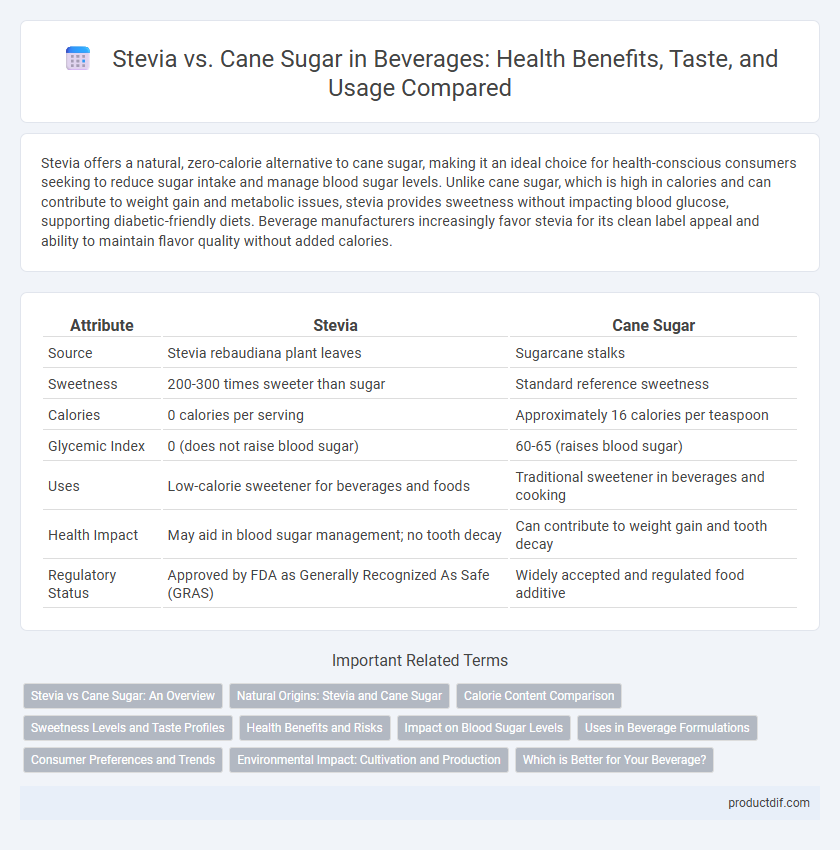Stevia offers a natural, zero-calorie alternative to cane sugar, making it an ideal choice for health-conscious consumers seeking to reduce sugar intake and manage blood sugar levels. Unlike cane sugar, which is high in calories and can contribute to weight gain and metabolic issues, stevia provides sweetness without impacting blood glucose, supporting diabetic-friendly diets. Beverage manufacturers increasingly favor stevia for its clean label appeal and ability to maintain flavor quality without added calories.
Table of Comparison
| Attribute | Stevia | Cane Sugar |
|---|---|---|
| Source | Stevia rebaudiana plant leaves | Sugarcane stalks |
| Sweetness | 200-300 times sweeter than sugar | Standard reference sweetness |
| Calories | 0 calories per serving | Approximately 16 calories per teaspoon |
| Glycemic Index | 0 (does not raise blood sugar) | 60-65 (raises blood sugar) |
| Uses | Low-calorie sweetener for beverages and foods | Traditional sweetener in beverages and cooking |
| Health Impact | May aid in blood sugar management; no tooth decay | Can contribute to weight gain and tooth decay |
| Regulatory Status | Approved by FDA as Generally Recognized As Safe (GRAS) | Widely accepted and regulated food additive |
Stevia vs Cane Sugar: An Overview
Stevia, a natural zero-calorie sweetener derived from the Stevia rebaudiana plant, offers a healthier alternative to traditional cane sugar, which contains approximately 16 calories per teaspoon. Unlike cane sugar, stevia has a negligible impact on blood glucose levels, making it suitable for diabetics and those seeking to reduce sugar intake. Stevia's intense sweetness, often 200 to 300 times sweeter than cane sugar, allows for smaller quantities in beverages, enhancing flavor without added calories or glycemic load.
Natural Origins: Stevia and Cane Sugar
Stevia is derived from the leaves of the Stevia rebaudiana plant, a natural, zero-calorie sweetener native to South America known for its intense sweetness without impacting blood sugar levels. Cane sugar comes from sugarcane, a tropical grass cultivated primarily in countries like Brazil, India, and Thailand, providing a natural source of sucrose with caloric energy. Both sweeteners maintain their natural origins, but stevia offers a plant-based alternative with minimal processing compared to the refined extraction process of cane sugar.
Calorie Content Comparison
Stevia contains zero calories, making it a popular sugar substitute for calorie-conscious consumers compared to cane sugar, which provides approximately 16 calories per teaspoon. This significant calorie difference supports weight management and reduces the risk of metabolic diseases linked to high sugar intake. Choosing stevia over cane sugar helps lower overall calorie consumption without sacrificing sweetness in beverages.
Sweetness Levels and Taste Profiles
Stevia offers intense sweetness with zero calories, often described as having a slightly herbal or licorice-like aftertaste, while cane sugar provides a balanced, clean sweetness with a caramel-like depth. Stevia's sweetness potency is approximately 200-300 times that of cane sugar, making it effective in small quantities without the glycemic impact. Cane sugar contributes to browning and caramelization in beverages, enhancing flavor complexity, which stevia lacks due to its chemical composition.
Health Benefits and Risks
Stevia, a natural zero-calorie sweetener derived from the Stevia rebaudiana plant, offers significant health benefits such as blood sugar regulation and reduced risk of obesity and diabetes compared to cane sugar. Cane sugar, composed primarily of sucrose, contributes to increased calorie intake, blood glucose spikes, and higher risk of metabolic disorders when consumed excessively. While stevia may cause mild digestive issues in some individuals, cane sugar's long-term health risks like tooth decay and cardiovascular disease are more extensively documented.
Impact on Blood Sugar Levels
Stevia contains zero calories and has a negligible effect on blood glucose, making it an ideal sweetener for individuals managing diabetes or insulin resistance. Cane sugar rapidly increases blood sugar levels due to its high glycemic index, contributing to insulin spikes and potential metabolic issues. Studies highlight stevia's role in improving glucose tolerance, contrasting with cane sugar's link to elevated blood glucose and increased risk of type 2 diabetes.
Uses in Beverage Formulations
Stevia is widely used in beverage formulations as a natural, zero-calorie sweetener ideal for diet sodas, flavored waters, and teas, appealing to health-conscious consumers. Cane sugar provides a traditional sweetness profile and mouthfeel, commonly found in sodas, juices, and energy drinks, though it adds calories and impacts glycemic response. Formulators balance sweetness intensity and flavor masking, often blending stevia with cane sugar or other sweeteners to enhance taste and reduce overall sugar content.
Consumer Preferences and Trends
Consumer preferences in the beverage market increasingly favor stevia over cane sugar due to its natural origin and zero-calorie profile, aligning with health-conscious trends and demand for low-sugar alternatives. Market data shows a significant rise in stevia-containing products, particularly in beverages like teas, sodas, and energy drinks, driven by growing awareness of diabetes and obesity concerns. Brands leverage stevia's clean taste and natural label claims to attract younger, wellness-focused consumers seeking healthier, sustainable sweetening options.
Environmental Impact: Cultivation and Production
Stevia cultivation uses significantly less water and land compared to cane sugar, making it a more sustainable choice for beverage production. Cane sugar farming often involves deforestation and high pesticide use, contributing to soil degradation and biodiversity loss. Stevia's lower carbon footprint during cultivation and processing also reduces the overall environmental impact in beverage supply chains.
Which is Better for Your Beverage?
Stevia offers zero calories and a minimal impact on blood sugar, making it ideal for health-conscious beverage consumers seeking natural sweeteners. Cane sugar provides a rich, familiar taste and texture that enhances flavor but contributes to higher calorie content and potential blood sugar spikes. Selecting between stevia and cane sugar depends on balancing sweetness preference, caloric intake, and dietary goals in beverage formulation.
Stevia vs Cane Sugar Infographic

 productdif.com
productdif.com